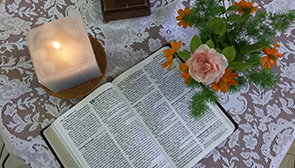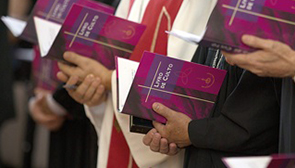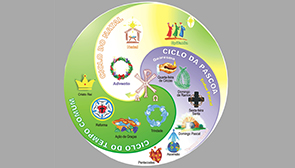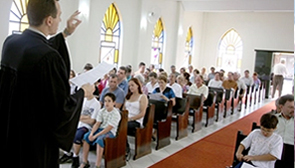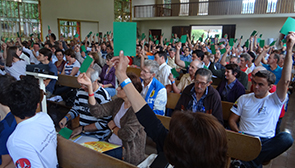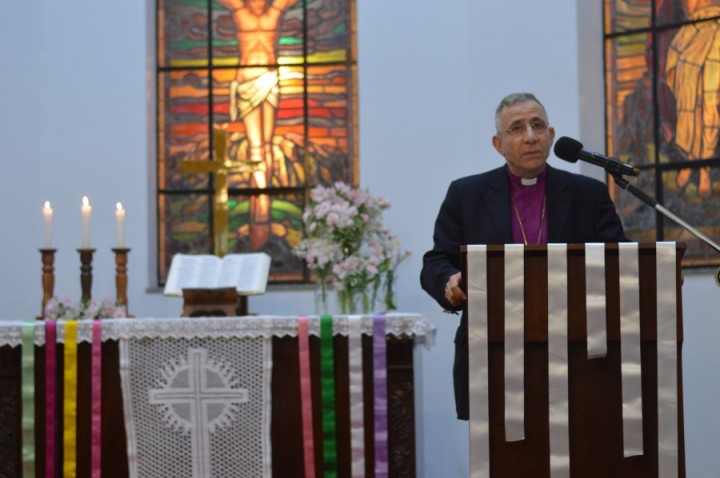
الكنيسة الإنجيلية اللوثريـــــة في الأردن والأراضي المقدسة
The Evangelical Lutheran Church in Jordan and the Holy Land
The grace of our Lord Jesus Christ, the love of God, and the communion of the Holy Spirit, be with you all.
Theme: Jeremiah 29:7
Brazil, October 2014
Sermon by Bishop Dr. Munib Younan
Bishop of the Evangelical Lutheran Church in Jordan and the Holy Land
President of the Lutheran World Federation
+++
Jeremiah 29:7
“But seek the peace of the city where I have sent you into exile, and pray to the LORD on its behalf, for in its peace you will find your peace.”
Dear sisters and brothers in Christ,
I wish to convey my greetings to you from the Lutheran World Federation and the one hundred forty-four member churches it represents. Greetings also from Jerusalem—my home, and your spiritual home. I am so happy to be here with you for this General Council of the Evangelical Church of the Lutheran Confession in Brazil. Thank you for inviting me to share the Good News with you today. This is the strength of our Lutheran communion—that we accompany each other on the way to Emmaus, similar to the two disciples. It is only at the Holy Table of the Eucharist that Christ reveals himself to us and commissions us for holistic mission, including prophetic diakonia.
Let me express my gratitude to be among the IECLB while meeting the General Council. It is for me the first time to be among you but not in the first time I have met you. Extraordinary personalities from the past come to my mind: my predecessor in the 90’s Dr. Brakemeier, former LWF president and Rev. Kirchheim, former LWF vice-president. Also I want to mention here my brother Rev. Dr. Walter Altmann, who has given a lot to the LWF and we were very proud to have him as the moderator of World Council of Churches. Your church has also been generous in sharing invaluable persons to the LWF communion office, currently Dr. Elaine Neueufeldt and Dr. Carlos Bock. Also currently, as council members, Rev. Marcia Blasi and Rev. Cibele Kuss.
But let me also share with you that I have also met you already in the form of positive comments that I have heard about IECLB being the largest Lutheran church in the region, members of the LWF, you have never made you size a prevailing factor to work together with sister churches in the region. Instead, you work together at eyes height, offering your gifts in ways that these are welcomed and well received. Thank you for this witness of mutuality. Thus you are today running the institute on Sustainability of the church: with and on behalf of the region, generating important processes of reflection and practice among churches in the region.
Let me also share with you my deep gratitude for the ways in which you responded last year to the LWF’s call to come in support to our sister churches in Namibia and Angola as they were facing a terrible drought. We value your speedy response and you loving commitment to stand together with those suffering, albeit far away. Thus the vitality of communion relations in the LWF has been expressed in wonderful ways.
The text we have for today is a problematic one. In fact, as I was preparing for this sermon, I had to ask myself, “Why did the Lutheran Church in Brazil choose this text?” When I read this passage from Jeremiah, I see warning lights and signs announcing “Danger Ahead!”
I am a Palestinian living under occupation. Since 1948 and again in 1967, many of my people have left for other lands, seeking refuge in various parts of the Middle East. Even today in places like Lebanon, Syria, and Jordan, my Palestinian brothers and sisters are living still as refugees, having never been normalized or given citizenship, except that of refugees. The Palestinian refugee question, since 1948, has first and foremost been a national question. The contemporary Palestinian national movement is largely the product of their desire to reverse their dispossession.
I myself am also a refugee from Beer Sheva. I continue to hold an UNRWA (United Nations Relief and Words Agency) card. It has always been a dream to go back. This is the reason that no Arab country has normalized integration, leaving the hope of the right of return. Palestinians are asking for a recognition of the injustice done to them. Once this recognition is affirmed, then a political solution will be found. As I visit my compatriots, I see that they are yearning to return. Would Jeremiah, in this scripture text, tell them, “Enjoy your stay in the refugee camp”? Or “Live a normal life in the diaspora”?
Today we see that our Christian sisters and brothers across the Middle East continue to flee because of the desperate economic situation, the growth of extremism, and the lack of any sign of peace on the horizon. This is the reality we are facing today, and it makes me question the prophet Jeremiah, who seems to pronounce an oracle of exile to the people he loves. Jeremiah himself was a nationalist. He himself had suffered. He himself was persecuted. And yet we read that he tells his people, who had been exiled, “Build houses outside your country. Plant gardens and raise families outside of Jerusalem. Live and work and pray outside the place where God’s name is living.”
And not just that, but this greater challenge: “Seek the peace of the city where God has sent you into exile, and pray to the LORD on its behalf, for in its peace you will find your peace.” This was a great difficulty for those sent into exile from Jerusalem to Babylon, and it is a great difficulty for me today. How can I, a Palestinian Christian and a refugee, read this text?
I was once speaking to a group of schoolchildren in Germany about the emigration of Christians away from the Middle East. One little girl raised her hand and told me, “Dear Bishop, why are you worried about this? Today, the youth are happy to be free! We are free to go wherever we can find our future, wherever we can live better. We can go wherever we want to go!”
I tried to argue with her: “This is true. But when people leave from the Holy Land, Christians especially, who will remain? Who will be here to keep the faith, in the land where our faith was born?”
So I am really in conflict with myself, and with Jeremiah, when I read and preach this text. I find myself crying out along with the psalmist: “How can we sing the Lord’s song in a foreign land?” (Psalm 137:4) How can we sing for peace in places where we experience injustice, extremism, or abuse of power? How can we pray for the peace of those who occupy us, or who have sent us into exile? How can we trust that God’s hand is at work even in this chapter of our history?
This is a challenging text for me, as well as a challenging message for our time. Jeremiah was a prophet, delivering difficult and unpopular news both to his people, and to those in power, and he suffered great consequences because of it. Our challenge today is that we don’t find such prophetic leaders who will see the will of God and speak it boldly. Many of our political leaders have double-standards. They speak of justice, but want it first for themselves. They speak of liberty and freedom, but only for their own countries and peoples. They want peace, but want also to retain their own power and privilege. Today, I ask: Where is the prophetic voice of the Church, even though it may be unpopular like Jeremiah’s voice?
In recent years, we have seen in the Middle East some changes which at first seemed to prophesy a new and better future. And in fact, the spark of the so-called Arab Spring was genuine. The push for dignity, gender justice, freedom of speech, freedom of religion, and equal employment opportunities, was right and good. But of course what we found was that those who sparked these movements did not come to power. Extremists have leaders and political programs which have mastered the democratic elections, and for this reason extremism has held us hostage in the Middle East.
Given this reality, as well as my social context, it is possible for me to read these verses from Jeremiah and hear him saying to my brothers and sisters in the Middle East: “Don’t worry! Just be quiet. Live your lives, plant gardens, raise families, but trust the God of justice.” It is possible to interpret Jeremiah’s injunction to “Pray for peace” to mean, “God wants you to support the status quo. God wants you to be content to live as exiles.”
But this, we know, is not the will of God. The German theologian Jeremias writes that the core message of the Old Testament is justice. And we know that the yearning for justice will never be extinguished in the human heart, even in the midst of oppression. This is the Good News we have heard proclaimed boldly from Latin America, the home of liberation theology. The voice of liberation never ceased. The yearning for God’s justice never tired. For you believed in neither dictatorship nor oppression, but only in a God of justice, who liberates and unites humanity in justice and dignity, as did the people in exile.
From here in Brazil, we heard the voice of Leonardo Boff, who said, “What is necessary is a spirituality of resistance and of renewed hope to turn ever back to the struggle in the face of the defeats of the oppressed.” (Introducing Liberation Theology.) From El Salvador, Oscar Romero taught us, “Liberation that raises a cry against others is no true liberation. Liberation that means revolutions of hate and violence and takes away lives of others or abases the dignity of others cannot be true liberty.” (The Violence of Love) And from Peru, Gustavo Gutierrez proclaimed: “The building of a just society means overcoming every obstacle to the creation of authentic peace.” (A Theology of Liberation)
It is true that at a certain time, liberation theology was accused of being a Marxist-Leninist-Communist ideology. Those who oppose justice will use any naming, labeling, or stigmatizing to frighten the multitudes. But wherever people have been aiming for justice and life, liberation theologies have guided them in the path of freedom and dignity.
Gutierrez, Boff, Romero, and others, are the prophets like Jeremiah who have dared to speak truth to power, and to resist every form of oppression. Like a flame in dry grass, their powerful witness warmed the hearts of the people and ignited movements that did not accept less than justice. From the liberation theology of Latin America, we in the Middle East have learned that in the face of injustice, imprisonment, occupation, imperialism, or La Conquista, the will of God is that we would never give up. The human heart will never give up the notion of liberation for all of God’s children.
Of course, it must not be ignored that the voice of the liberationists was so powerful because it emanated first from the Church. This flame was strong because it came from the light of Christ, who on the cross suffered in solidarity with all who suffer, and whose resurrection liberated the world from the empire of sin and death. As long as the church continues to lift its voice, implanting in people the power of their dignity as children of God, bearing God’s likeness, then this flame will never be extinguished. Those who know Christ know they are already liberated. They are free, not because of the will of politicians, but because of the power of the cross. The cross of Christ empowers the Church never to accept what the world accepts, but to raise our voice against any power or principality which oppressed any human being.
Hear again the voice of the prophet Jeremiah, who said to his people while they were in Babylon: “But seek the peace of the city where God has sent you into exile, and pray to the LORD on its behalf, for in its peace you will find your peace.”
These were not words spoken to calm the masses, to quiet the instigators, or to encourage apathy in the face of oppression. Rather, I am reminded of another great theologian, Dom Helder Camara, who said, “Without justice and love, peace will always be the great illusion.” From this we learn that the struggle for human rights, for freedom, and for dignity, is never in opposition to peace but is laying the foundations for it. When the Church preaches peace without raising its voice prophetically for justice, it becomes like those about whom the prophet Jeremiah bemoaned, “They have treated the wound of my people carelessly, saying, ‘Peace, peace’, when there is no peace.” (Jeremiah 6:14) But a Church which speaks and acts boldly joins the melody of Psalm 85, singing together with all the saints: “Steadfast love and faithfulness meet; righteousness and peace kiss each other.”
From Brazil, I call on the Church of God to be prophetic. The power of the Church is never in its prosperity, the numbers of its membership, its bank account or good works. The power of the Church is in transmitting the will of God and the love of Christ to its people and to the world. The power of the Church is prophetic when it proclaims equality, dignity, and abundant life to all.
Last October, the LWF General Secretary Martin Junge and I, as President, with a delegation of the vice presidents, had the opportunity to visit His Holiness Pope Francis in Rome. While there, we presented him with a gift that was neither silver nor gold—a rusted old teapot from a Somali refugee camp in Dadaab, Kenya (a camp funded in part by the Lutheran World Federation.) When Pope Francis received this teapot, he was so moved that he jumped from his seat and said to us: “What we need today is an ecumenical martyria.”
These words from my brother in Christ have stuck with me. He reminds us that the question for today is not how much one person or one Church body strives for justice or shares the Gospel of love, but rather how we can do it together as brothers and sisters in Christ. Are we willing as churches to work together for justice? If the voice of one prophet, Jeremiah, has been heard for thousands of years and is still influencing us today, just imagine if Christians became one prophetic voice for justice together. Together, we can become a symphonia of justice. Together, this voice will disturb the powers of injustice and oppression, and will create the foundations for a true and lasting peace. Together, we can implant hope in many hopeless situations. This ecumenical martyria of which the Pope speaks is our evangelical call in a globalized and broken world. The world does not demand of us as Churches, except our unity for justice, peace, and reconciliation.
May God give us the strength to raise our voice together, an ecumenical martyria for justice and peace, for the sake of our Lord Jesus Christ. And may the peace of God, which surpasses all understanding, guard your hearts and minds in Christ Jesus. Amen.



